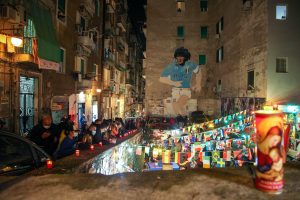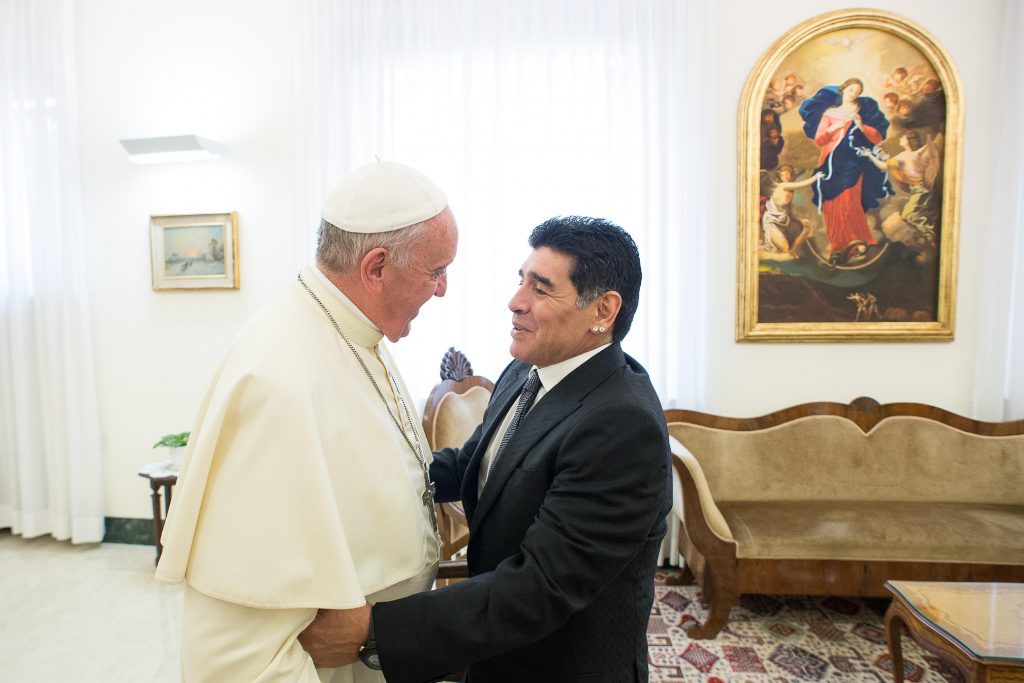ROSARIO, Argentina — If you ever find yourself in Italy, you’ll be hard-pressed to find a taxi driver who doesn’t drive with a prayer card with Pope Francis’ face. And if you venture down south to the city of Naples, you’ll see there’s another Argentine who’s just as omnipresent: Diego Maradona, the soccer star who died Nov. 25 at age 60.
Although radically different in a myriad of ways — beginning with their soccer ability — one was arguably the greatest player in history and the other a self-confessed owner of “two left feet” who could only play goalkeeper. Their bank accounts, too: Upon his death, Maradona had a net worth that Forbes magazine couldn’t estimate, while Pope Francis, a Jesuit, made a vow of poverty many decades ago.
Yet they also had some things in common that go beyond their nationality and the fact that both rose to international fame upon moving from Argentina to Italy. Take those Italian drivers, for example, who carry the picture of their favorite Argentines and praise them both to no end, and who still willingly offer a “but.”
In the case of Maradona, his lifestyle was not always a virtuous one. He struggled with drug and alcohol addictions; had children with several women whom he at times refused to recognize; and his praise for communism, with a long history of lending his face to both the Cuban and Venezuelan regimes, both of whom paid him millions for that support.
In the case of Pope Francis, taxi drivers and working-class Italian Catholics often take issue with his sympathy for pro-immigration causes; his perceived meddling in Italian politics; and the fact that he rarely addresses middle-class Catholics, which he acknowledged speaking with journalists during an inflight press conference in 2015.
Yet having been born in a slum, Maradona famously never forgot his humble beginnings: He was always there to lend a hand — or one of his legs — and wasn’t afraid of getting his “feet in the mud” to do so.
In 1985, shortly after joining Naples’ struggling soccer team, he was invited to play in a charity match in one of the city’s dirt fields. His coach refused to let him play, but Maradona showed up anyway, with the entire Napoli team in town. They won 4-0, and when the money collected proved insufficient, he covered the rest out of pocket.
It was often said that “El 10” exuded a childlike joy when playing such matches, where field conditions resembled the ones he grew up playing in. Likewise, during his days as the archbishop of Buenos Aires, the future pope was known to be much more at ease walking through the city’s slums than its posh neighborhoods.

Born and raised in a shantytown, Maradona cultivated a man-of-the-people persona, and much like the pope, credited a woman with passing on the faith to him (in Maradona’s case, his mother; in Pope Francis’, his grandmother).
Despite his upbringing, the player publicly struggled with his faith. Back in 1987, he famously clashed with St. Pope John Paul II on the issue of wealth disparity.
“I argued with him because I was in the Vatican and I saw all these golden ceilings and afterwards I heard the pope say the Church was worried about the welfare of poor kids,” Maradona once recounted. “Sell your ceiling then ‘amigo,’ do something!”
It took the election of an Argentine as pope for Maradona to settle his beef with the Church.
In 2014, Maradona played at the first charity soccer match organized by the Vatican. During a press conference, he said, “Everybody in Argentina can remember ‘the hand of God’ in the England match in the 1986 World Cup. Now, in my country, the ‘hand of God’ has brought us an Argentinian pope.”
(The “Hand of God” is the nickname of the infamous 1986 World Cup match against England, in which the referee inexplicably allowed a goal scored with the help of Maradona’s hand to stand.)
“Pope Francis is even bigger than Maradona,” Maradona said. “We should all imitate Pope Francis. If each one of us gives something to someone else, no one in the world would be starving.”
Two years later, Maradona credited Pope Francis for the revival of his faith and his return to the Catholic Church after he met him in a private audience at the Vatican.
“When he hugged me, I thought of my mother and inside me, I prayed. I’m glad I’ve come back to the Church,” Maradona said at the time.
His faith, according to what he told an Argentine priest in 2019, was a “simple” one, rooted in what his mother had taught him. Father Gustavo Rubio, whom Maradona called one day to visit the soccer team he was coaching at the time, said the legend expressed regret for the many mistakes he’d made in life.
“I was impressed by the fact that Diego could recognize his flaws, the mistakes we all make, and said to me, ‘I’m not an example for anyone,’ ” the priest said. “It was important that he wanted to recognize his limits and smallness.”
The differences between the two certainly outshine the similarities. Yet, in the days after Maradona’s passing, Pope Francis, often described by observers as a chess player who’s always several moves ahead in virtually every major decision he takes, seems to have taken a page from the star’s playbook for the ongoing “game” that is Argentina’s debate on liberalizing its abortion law.
The other goal that Maradona scored in that 1986 match against England was considered his greatest of all time, the ultimate combination of his dribbling ability, vision, close ball control and creativity.
Now, his fellow countryman in the Vatican is hoping that creative messaging, surprise phone calls, and “passing the ball” to a lay-led ecumenical coalition in Argentina will help score a victory against the country’s supporters of legal abortion, a team that includes its president, Amnesty International, and other international organizations.

